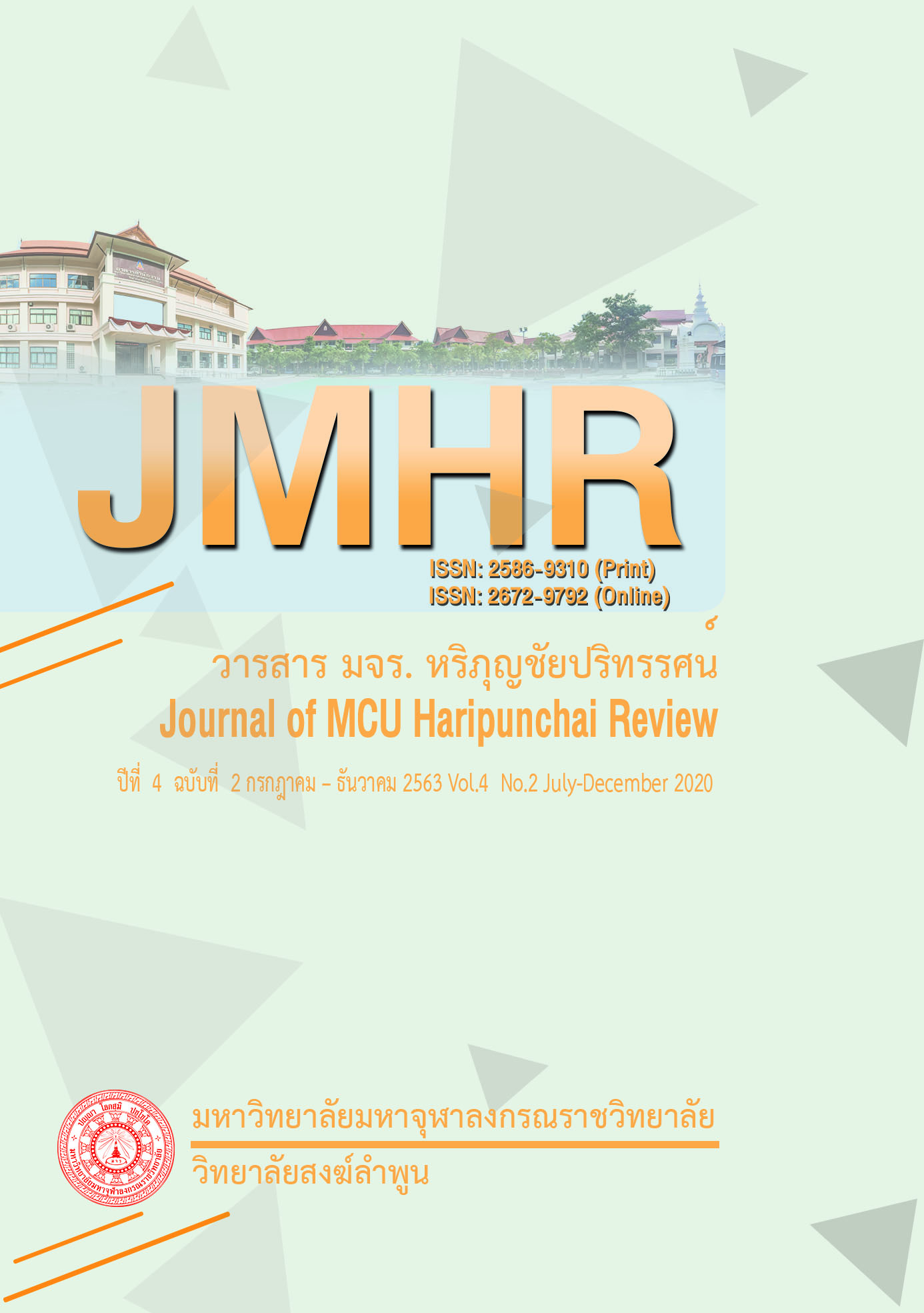Guidelines for Teaching Skills Development of Teachers of Border Patrol Police Schools
Main Article Content
Abstract
This research was to study obstacles, methods and propose guidelines for developing teaching skills of Border Patrol Police School teachers. It was qualitative research by in-depth interview, both face-to-face interview and telephone interview for more convenience. Ten people analyzed descriptive data, found that obstacles to skill development. Teacher teaching There are still obstacles in some subjects that are not fully understood, such as Mathematics, English, Science, etc. Teachers' teaching skills development methods. The teacher used farming activities. Organizing teaching and learning activities is one way to help teach. Continuing education It was found that teachers were encouraged to study, train and visit both in the country and abroad. There is a budget to develop a signal network or an Internet service provider to install a long distance antenna. There is a development of a body of knowledge in modern agriculture research, sufficiency economy philosophy, research, experiment, compare and practice by themselves. Looking at the geographic context of the learners to achieve learning Is to create closeness There is a system of support and support for one another. Create a good and lively communication system Learner groups are analyzed, flexibility of activities, to cover content and objectives. Until getting one success It is a symptom that occurs in the mind itself without force.
Article Details
References
จิตรา มีคำ. ปัญหาและแนวทางการบริหารจัดการโครงการส่งเสริมคุณภาพการศึกษาของโรงเรียนตำรวจตระเวนชายแดนสังกัดกองกำกับการตำรวจตระเวนชายแดนที่ 31 ในพื้นที่จังหวัดพิษณุโลก. [ออนไลน์]. แหล่งที่มา : https://www.tci-thaijo.org/index.php/GraduatePSRU/article/view/55501 [ 9 มิถุนายน 2563].
ปนัดดา อามาตร ปิยาภรณ์ ศิริภานุมาศและ เผ่าพงษ์พัฒน์ บุญกะนันท์. (2560). ปัญหาและแนวทางแก้ไขการจัดการเรียนการสอนของโรงเรียนขยายโอกาสทางการศึกษาใน สังกัดสำนักงานเขตพื้นที่การศึกษาประถมศึกษาบุรีรัมย์ เขต 2. การประชุมวิชาการเสนอผลงานวิจัยระดับบัณฑิตศึกษาครั้งที่ 2 มหาวิทยาลัยราชภัฏมหาสารคาม.
พรรณี อาวรณ์และ แก้วเวียง นำนาผล. (2557). การพัฒนาครูในการจัดการเรียนรู้ด้านการคิดวิเคราะห์โรงเรียนผาน้ำทิพย์วิทยา สำนักงานเขตพื้นที่การศึกษามัธยมศึกษา เขต 27. วารสารบัณฑิตวิทยาลัย พิชญทรรศน์. ปีที่ 9. ฉบับที่ 2. (ก.ค.-ธ.ค.) :70.
ภิญญาพัชญ์ กาวินคำ. (2560). สมรรถนะตามความเป็นจริงของครูผู้สอนในโรงเรียน ขนาดเล็กในเขตพื้นที่ตำาบลเวียงชัย. วารสารการวิจัย กาสะลองคำ. ฉบับที่ 11 เล่มที่ 3 (วารสารฉบับพิเศษ) : 19-20.
ภาสกร เรืองรอง และคณะ. (2558) เทคโนโลยีการศึกษากับครูไทยในศตวรรษที่ 21. วารสารปัญญาภิวัฒน์. ปีที่ 5. (ฉบับพิเศษ ประจำเดือนพฤษภาคม) : 195.
มรกต วงษ์เนตร. (2558). การศึกษาปัญหาและแนวทางการพัฒนาครูเพื่อการจัดการเรียนรู้ที่ส่งเสริมทักษะการคิดของนักเรียนโดยใช้หลักการบริหารวงจรเดมมิ่งในโรงเรียนขยายโอกาสทางการศึกษาสังกัดสำนักงานเขตพื้นที่การศึกษาประถมศึกษาพระนครศรีอยุธยา เขต 1. วารสารวิจัยและพัฒนา วไลยอลงกรณ์ ในพระบรมราชูปถัมภ์ สาขามนุษยศาสตร์และสังคมศาสตร์. ปีที่ 10 ฉบับที่ 1 (เดือนมกราคม – เดือนเมษายน พ.ศ.: 1.
รัชนี อมาตยกุล. (2556). ปัญหาของครู คุณภาพของครู. เอกสารประชุมร่วมกับผู้ตรวจการแผ่นดินเมื่อเดือนกรกฎาคม 2555. (เอกสารอัดสำเนา).
สำนักบริหารงานการมัธยมศึกษาตอนปลาย สพฐ. (มปป). แนวทางการจัดการเรียนรู้ในศตวรรษที่ 21. เอกสารโครงการศึกษาและพัฒนาโรงเรียนในโครงการทักษะการเรียนรูในศตวรรษที่ 21.
สำนักงานโครงการสมเด็จพระเทพรัตนราชสุดา ฯ สยามบรมราชกุมารี. (2559). สถานศึกษาในโครงการพัฒนาเด็กและเยาวชน ปีการศึกษา 2559. (เอกสารอัดสำเนา).
สุกัญญา งามบรรจง. (2559).การพัฒนารูปแบบการจัดกระบวนการเรียนรูเพื่อเสริมสร้างทักษะในศตวรรษที่ 21 ผ่านกิจกรรมลดเวลาเรียน เพิ่มเวลารู ของสำนักงานคณะกรรมการการศึกษาขั้นพื้นฐาน. รายงานการวิจัย. สำนักวิชาการและมาตรฐานการศึกษา. (สำนักงานคณะกรรมการการศึกษาขั้นพื้นฐาน กระทรวงศึกษาธิการ.
Bayar. A. (2014). “The Components of Effective Professional Development Activities in Terms ofTeachers’ Perspective.” International Online Journal of Educational Sciences. 6.2: 319-327
Reid. A.J. (2014). Teacher Developing Understanding of Enquiry Based Learning. Newcastle: University of Newcastle Upon Tyne.
Wang. X. (2014). “Encouraging and being encouraged: Development of an epistemic community andteacher professional growth in a Singapore classroom.” Teaching & Teacher Education. 44. (November):12-24


